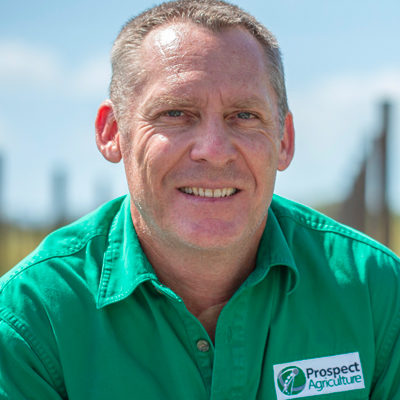
Chris Monsour
Regional Winner | Sustainability
Bowen, QLD
Chris Monsour is an adviser at Prospect Ag and a 2020 Growth Awards Regional Winner in the Sustainability category. While Chris was nominated for the Innovator category, through the judging process it was clear his contributions to agriculture, rural and regional Australia more closely aligns with our Sustainability category. Read on to learn more about Chris.
What’s the one thing you have done in your career you are most proud of?
The most satisfying thing I have done is develop a business that has in turn allowed growers to make their own businesses successful. It’s about arming producers with the ability to deal with whatever is thrown at them and meeting my clients’ needs. My clients rely on me to be across new developments or new technology that could potentially fit into their business. Growers are pretty busy just doing their thing and I step in there to help. My role is not just going out there and monitoring and providing advice about pest management, it’s about bringing to them things that can elevate them above their competition and make them prosperous.
How will you share what you learn with others in the industry?
I have always had an open policy for sharing my knowledge with anyone. I have demonstrated this across my career working with anyone in the community ranging from disadvantaged children who are unemployed locally, to professionals both in Australia and in New Zealand. During the pandemic, I’ve become a bigger user of social media and have even given updates on trials on YouTube to allow more people access to information. There is a lot of merit in this and I imagine I will be doing more of it to share my knowledge. I will always be part of pre-season grower meetings which give research updates and I find this an ideal way to share information.
What do you see as your biggest opportunity in the next 12 months?
The biggest opportunity is the development of an agave farm for a large client. It will be an innovative project which occupies a lot of my time in the next year. The client is a distiller based in Melbourne and I will help set up the first commercial agave farm in Australia. This will produce an Australian agave spirit, similar to tequila, for domestic and export markets. It will be a huge project but it’s exciting to be involved, as it is a crop which has a lot of potential in Australia beyond just the production of spirit. Not only is it a new crop and targeting new markets, but it will also involve the use of a range of new and interesting technology for Australian agriculture. My business is always changing and I have a policy of tackling something new every year for my own benefit and for the benefit of my staff and growers. I have always been interested in alternative crops and the great thing about this agave project is that there are opportunities beyond just agriculture, with tourism and even new industries to potentially flow on. Value-adding is where agriculture needs to head. The days are gone where agriculture can just focus on production and it is important to look to how value-adding can be built into production.
What is the biggest barrier to achieving success in the next 12 months?
The biggest barrier is not enough hours in the day and while some might think it is a matter of employing more people, it is not that simple. At one stage, I employed 12 people to cover the workload but it is difficult both attracting staff and then retaining them. I would invest time and money training staff only to have them poached by other companies. To this extent I have cut down on staff numbers and scaled back the business as it is difficult when key people leave. We need to have a presence in schools to encourage more people to be involved in agriculture and to explain that it is not only just growing things but uses cutting edge technology too.
What is the biggest challenge Australian Ag has to overcome in the next 10 years?
There are two big challenges in the next decade for agriculture – the disconnect between rural production and consumers, and labour. There is not enough consumer understanding of what goes into the production of high quality food. If they did understand, there would be more support for the necessities of production, like building and maintaining water infrastructure so that we (irrigators) do not run out of water in the changing climate. We need to build community awareness not only of Australian production systems, but of the absurdity of the un-level playing field in world agriculture. Australian producers are competing in a world market with famers from the US and the EU where production is heavily subsidised. Labour costs are also massive for growers and an impediment for business especially with the COVID-19 situation this year. Agriculture is not good at getting out and telling its story and while there is no place for arrogance, community support is needed to maintain the level of quality produce we have in Australia.